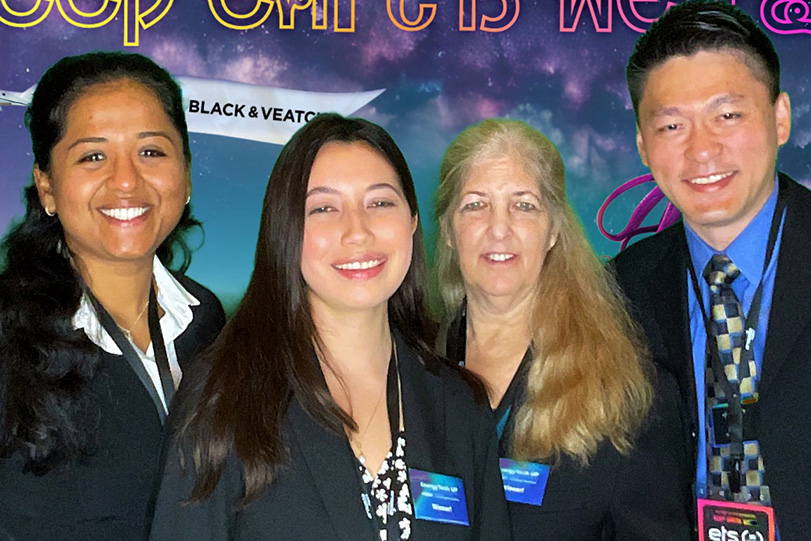Less carbon, more profit: Purdue team wins Great Lakes Regional EnergyTech Prize for net-zero biofuels project
Team Carbonbusters from Purdue University was selected as the Great Lakes Regional Winner in the EnergyTech University Prize. The team was awarded $3,000 for their business plan for their entry, “Removing the Barrier to Entry to Net-Zero Biofuels.”
Sponsored by the Office of Technology Transitions (OTT) at the U.S. Department of Energy, the EnergyTech University Prize (EnergyTech UP) is a collegiate competition challenging multidisciplinary student teams to develop and present a business plan that identifies an energy technology, assesses its market potential, and proposes a strategy for commercialization.
The interdisciplinary Purdue team included graduate students Sharon Hughes (ESE/EEE), Neha Shakelly (ESE/EEE), and Amanda Michelle Lopez Patiño (ESE/EEE), as well as Professor Zhi Zhou (Civil Engineering and Environmental and Ecological Engineering).
“I am so proud of our students for winning this prestigious award from DOE,” says Dr. Zhou. “At Purdue, we continuously strive to develop innovative and cost-effective solutions to global energy challenges. I am very impressed by our motivated students for coming up with creative solutions to contribute to net-zero carbon emissions. I hope future students join us in this endeavor as we work collaboratively toward a sustainable future.”
A total of 184 teams from 124 schools joined the competition this year. As the Midwest regional winners, the Purdue team recently attended the national championship in Austin, Texas, one of just 16 teams in the nation (top 8.7%) to reach this level of the competition. In addition to being the Great Lakes Regional Winner in 2023, the team was selected as a Technology Bonus Prize Semi-finalist twice in 2022 and 2023.

(Left to Right): Neha Shakelly (ESE/EEE), Amanda Michelle Lopez Patiño (ESE/EEE), Sharon Hughes (ESE/EEE), and Dr. Zhi Zhou (CE/EEE)
Reversing climate change with feedstocks
The U.S. has pledged to achieve net-zero emissions no later than 2050; however, it is estimated that 80% cars in the U.S. will still require liquid transportation fuels at that time. Thus, while electric vehicles will account for 20% of vehicles, a complementary solution is needed.
One solution to achieving net-zero emissions by 2050 is net-zero emissions liquid biofuels, which could potentially replace petroleum-based liquid transportation fuels. However, the problem for U.S. biofuels producers is that there is a lack of carbon-negative, low-cost feedstocks available to achieve this net-zero goal. In response, the Carbonbusters project proposed a carbon-negative biorefinery using sugarcane and algae as its feedstocks. The biorefinery will produce carbon-negative, low-cost feedstocks (sugarcane co-products, ethanol, and algae oil) to sell to U.S. biofuels producers.
Algae can be used for Biomass Carbon Removal and Storage (BiCRS), capturing carbon dioxide from the atmosphere and storing it for long periods of time. Carbonbuster's carbon-negative biorefinery would not only capture carbon via algae, but also transform it into revenue-generating feedstock that can be used to create net-zero liquid biofuels. While most carbon-capture projects cost money per ton of carbon reduced; this project would generate money for every ton of carbon reduced. Carbonbuster’s algae oil feedstock captures the most carbon and generates the most after-tax profit of any known BiCRS project.
The EnergyTech University Prize is designed in partnership with American-Made Challenges, which aims to incentivize the nation's entrepreneurs to reenergize innovation and reassert American leadership in the energy marketplace. View the team's presentation below!
